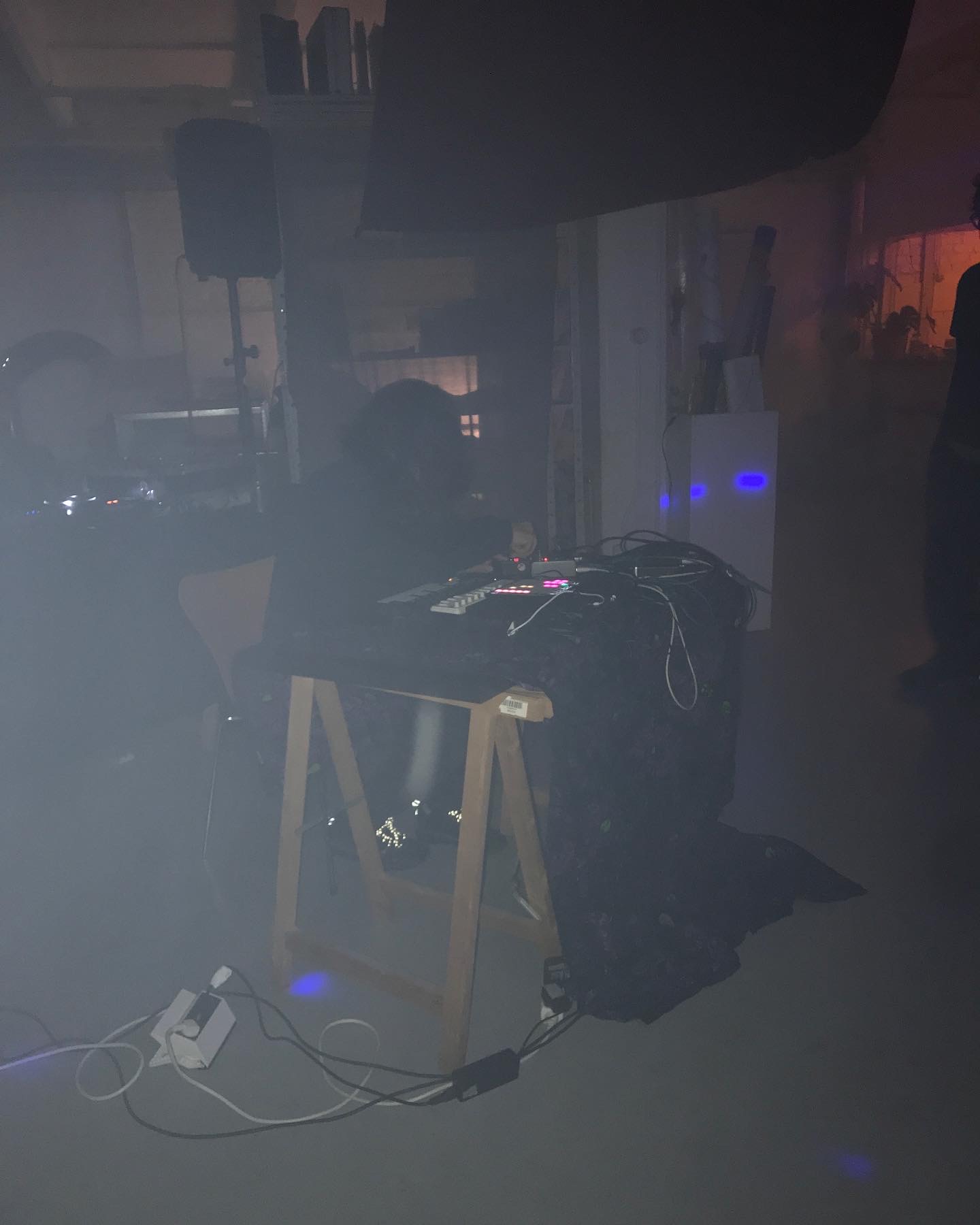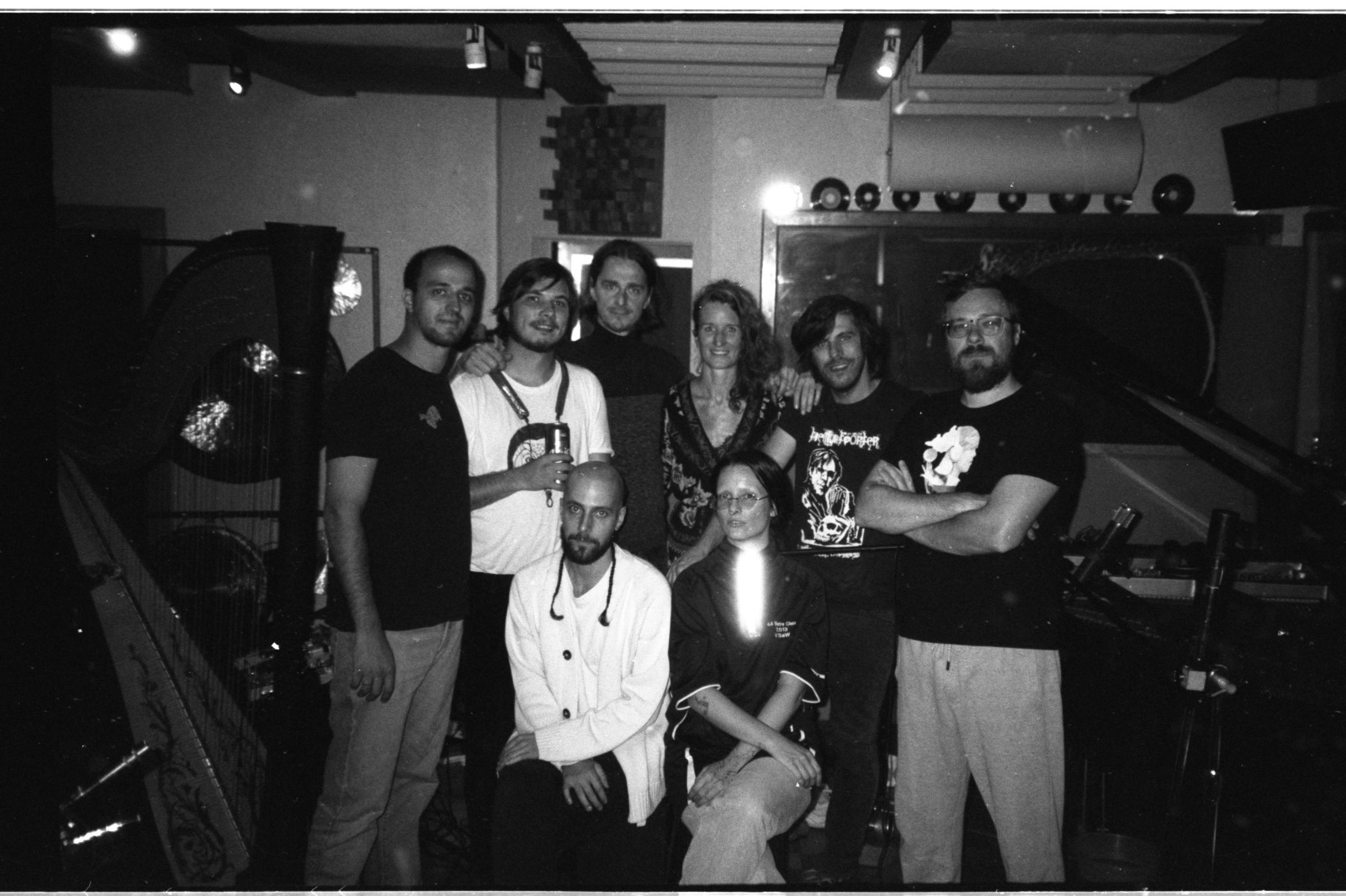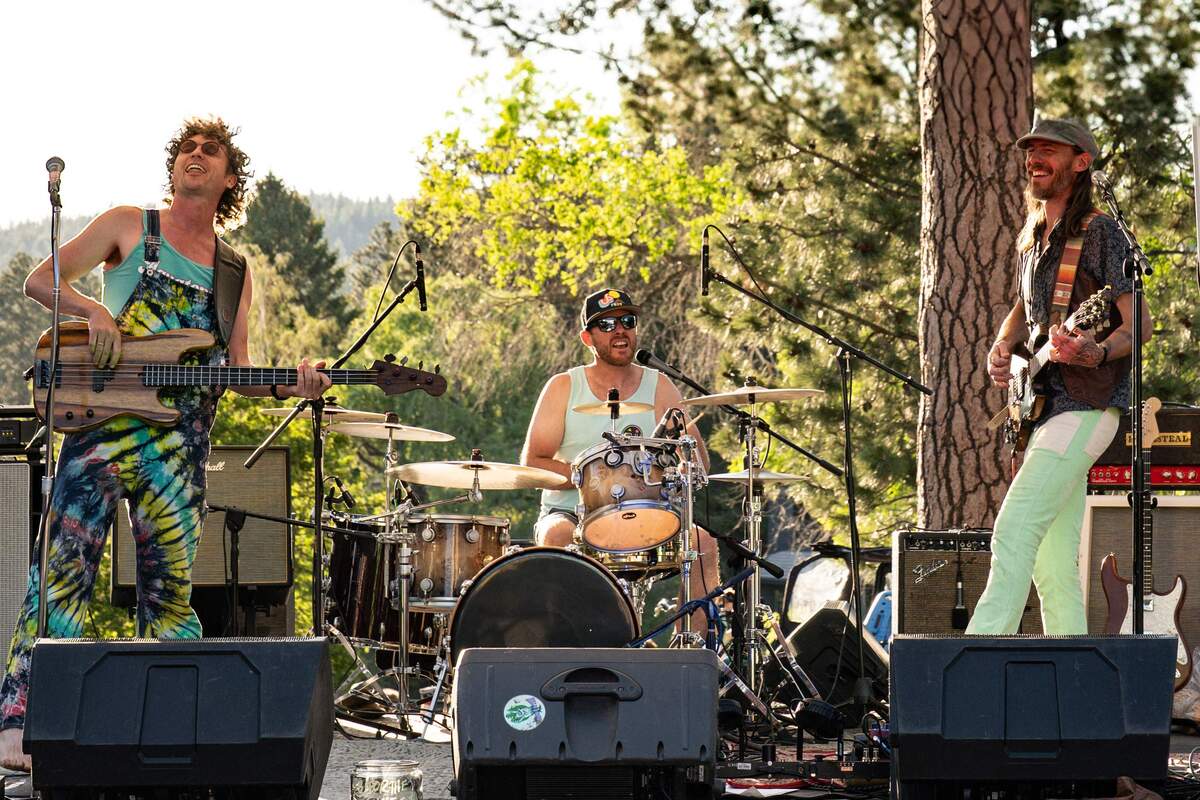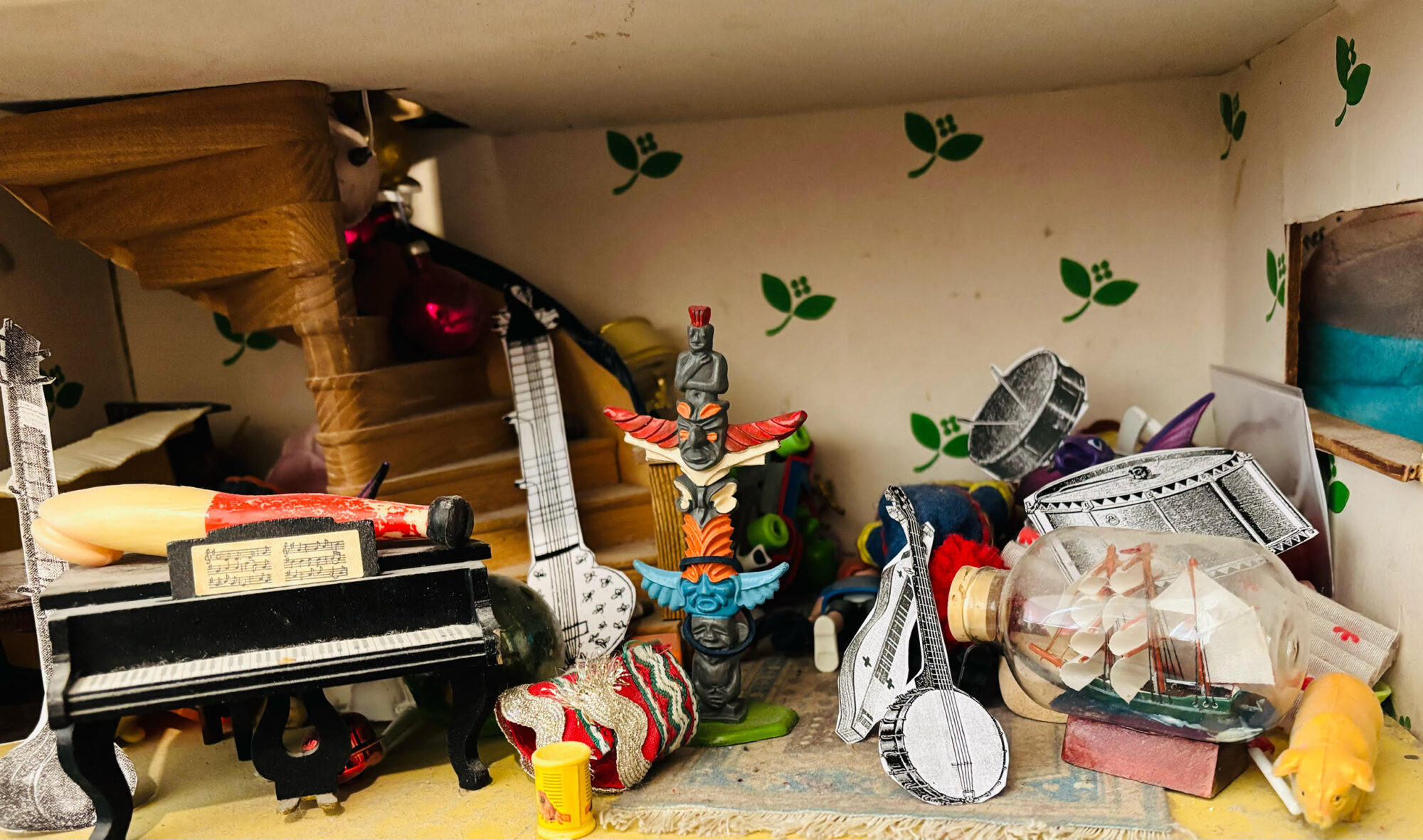Accou
Accou takes listeners on a journey through a dreamlike and otherworldly soundscape, fusing digital reveries, tribal flavors, and ethereal voices that evoke a sense of timelessness.
Through a collage of field recordings and a hypnotic interplay of synthesizers, Accou weaves a flamboyant yet delusional pilgrimage of a marauder on the edges of forthcoming enlightenment. His music is charged with psychedelic textures that transport you to a world where reality and fantasy meld in a symphony of sound. Working with cassette tapes and synthesizers, Accou creates drones and moods. Recently, he has begun incorporating more dynamic rhythms and structures into his compositions. Although his music has gained speed and digital complexity, it still resides within a spatial universe where time becomes lost amidst the textures and layering of sounds. Accou’s compositions invite listeners to traverse an imaginary and poetic realm where dreams and reality intertwine in a unique symphony.
“Boredom leads to crazy actions and unlikely encounters”
You live in Brussels but come from France. Where in France are you exactly from?
I grew up in Clermont-Ferrand, the city known for Michelin tires. It’s a very dark city, built of deep black volcanic stone. Due to its bowl-shaped topography, the air is rarified despite the beauty of the surrounding nature, which we rarely explore because it’s quite remote if you don’t have a car.
How was it to grow up there?
Clermont is a big city, yet isolated from the rest of France, offering unique adventures not found in metropolises. Moments of wandering are intense, with days when boredom leads to crazy actions and unlikely encounters.
Artistically, this isolation nurtures a deviant and mysterious culture, where artists evolve in unique universes, detached from the pressure of a career and self-promotion. At times, this lack of ambition is difficult to bear on a daily basis, even considered taboo. I realize that it reveals an authentic truth, far removed from superficiality and artificiality. I loved growing up in this context, even though it’s also why I decided to leave.
How did you get “into music”?
At the end of middle school and the beginning of high school, I spent a lot of time playing video games. A friend, who lived with his older brother and without parents, introduced me to a variety of new music, mainly rap. We spent our days digging up mini-discs in his room and drawing graffiti on calendars.
One day, this friend showed me software he had just installed: eJay HipHop. It was incredible, even though at the time, there wasn’t much we could do other than compile already-made stems. Then, one day, this friend got a cracked version of Fruity Loops, I think it was version 3 cracked by the H2O team.
In fact, this buddy introduced me to so many things. I remember I really didn’t understand anything about music; I had never really asked myself any questions about it. I naively thought that the samples used in rap were real people playing instruments live and on an infinite loop. I couldn’t tell the difference between a guitar, a bass, acoustic, and electronic. I guess it’s because when I was a kid, I thought with the same logic that in cartoons, the characters were humans wearing costumes. Oops.
So when I discovered Fruity Loops, it was a real revelation for me. I realized that this was how all music was made, without even knowing that machines like MPCs or synthesizers existed in hardware before. For me, the computer was the basis of everything. So I started learning little by little how to use it.
At first, I remember it took me months to discover the “magnet” mode, which means that when you place a note on the grid, it automatically aligns itself. It was chaotic; I didn’t understand what beats were either, 4-beat measures, ternary, none of that. So in my first compositions, I picked up a paintbrush and placed notes anywhere, it was a real mess.
I was registered on the FruityClub forum; we were fewer than 1000 members, a small community from the early days of the internet. I remember posting my first composition. Some users insulted me, saying it wasn’t a garbage can here, while others defended me, saying it was art, reminiscent of Autechre. I think it was a bit of both, honestly leaning more towards garbage. It felt like video games, but at the end of a level, you had an MP3 file. The Belgian company ‘Image-Line’ that developed Fruity Loops originally coded video game software, mostly adult video games. You can even feel this influence when looking at the interface and hearing the explosion sound when you open the software.
Before, it was still difficult to get information or tutorials. It took me two or three years to discover the playlist where you can mix your different patterns. I made my whole composition in the piano roll of the same pattern. Basically, I didn’t make loops but long patterns of several minutes.
Why did you choose electronic music?
Having no musical training whatsoever, electronic music seemed like a good solution, a chance for a non-musician to make music, sounds, and noise. And what’s more, it was “free” if you had a computer at home. I remember trying to install it on the computers in the school library.
At that time, I listened to a lot of Aphex Twin, but also DJ Cam, DJ Krush, DJ Shadow. I discovered new artists generally at the media library; I often headed towards the electronic section, to the letter D for DJ.
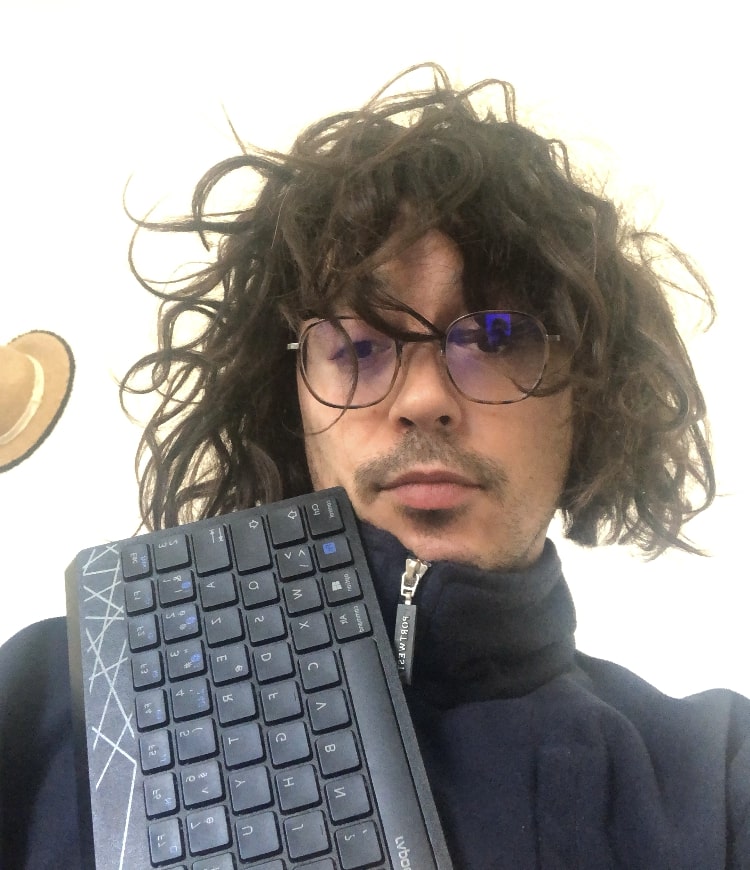
“I really went in all directions”
You started releasing music in 2012, which was 12 years ago. How did your music evolve between 2012 and now?
For a long time, this practice remained a diversion similar to playing video games, without me taking it too seriously. I really went in all directions, having many possibilities and different desires. It wasn’t until around 2010/2011 that I began to consider working more seriously on it.
I then stopped using the computer and bought a drum machine, a synthesizer, and a 4-track cassette recorder. I felt like I was starting from scratch, doing much simpler and more primitive things than what I could do with the computer, but really feeling what music was.
For example, with the computer, I never knew how to finish a piece; I could intellectualize everything but not really feel it, work instinctively. With hardware machines, for the first time, I was really making music. All I had to do was let myself go, feel it, and the piece would build itself up naturally.
For someone who had never made music before using the computer, this process was crucial to understanding what making music means, to feel it. In 2017, I reinstalled Fruity Loops, now FL Studio, to create the album ‘Serafine’. It wasn’t until 2020 that I really got back into computer sound production.
Today, I mainly use virtual instruments. I even reinstalled Fruity Loops 3 on an old XP tower. After this journey, I feel like I know better what I want to do. The limitations of hardware gave me discipline and artistic direction that I can now transpose into a software environment.
What does the name Accou refer to?
I had a hard time coming up with a name. “Accou” comes from my first email address, which I created when I was 12. I don’t really know why I chose that name, maybe it reminded me of a cartoon character or something. Back then, you weren’t supposed to put your real name on the Internet. So I went through a lot of more or less catastrophic pseudonyms, then one day my friends started calling me “Accou” because they thought my email address was funny. So I thought, why not go with that?
Do you see your music as music to listen to or to dance to?
It’s more like music to listen to. I had a very ambient and drone phase, but now my music is more rhythmic. My new sounds are more digital and dynamic, and you can certainly dance to them, but for me they still remain in this universe where space and time get lost in textures and sonic layering. In the early days of my practice, there were a lot of differences between my studio work and my live performances, but over time I’ve worked hard to reconcile these two aspects. Today, these differences are less pronounced.
On Facebook, you use the tags “sleep music,” “hypnosis,” and “synth” for your music. Could you explain this a bit to me?
That was a while ago on Facebook, I didn’t update much. So it suited my meditative ambient drone music.
On Bandcamp, on the other hand, I find the most intriguing tags “utopian” and “plunderphonics”. What’s the utopia you live in? What do you plunder?
Those are the tags that “rateyourmusic” attached to my ‘Graveyard Shift’ album, which I believe describe my music well. For me, these tags signify how samples and MIDI instruments are brought into an electronic environment. Plunderphonics is a compositional technique that involves utilizing and manipulating one or more recognizable recordings to create a new composition. Utopian Virtual is born out of Hypnagogic Pop, emulating late 20th-century futuristic and corporate aesthetics, often using ‘tacky’-sounding MIDI Music-esque instruments, in contrast to the looping, sample-based approach generally found in Vaporwave. Electronic music uses non-traditional electronic instrumentation and sound manipulation technology as the primary backbone of a composition.
I’ve really enjoyed using samples ever since I got back on the computer. I’m also a big fan of the Warp period of the 90s and early 2000s, and I always wondered how they produced these sounds, especially at that time. Then I discovered that it was mainly with samplers.
Today, I no longer wonder how to integrate MIDI and synchronize hardware instruments. When I like something, I simply record it in audio. I’ve also explored many archives of old CD samplers, widely used in video games too. In particular, I used them on the ‘Rhymes nor reason’ album, which for me is an album about this hardware, this heritage of samples that we have today.
I can imagine a future where we no longer select chords or instruments to compose with, but rather use samples or generated musical elements, forming works mainly consisting of collages. This existed in the early days of rap, before it became too expensive to use samples. But nowadays, many samples are royalty-free, not to mention those that can be generated by AI. While samples can be modified to become unrecognizable, I’m specifically referring to the use of recognizable samples in collage-based composition.
There’s a real heritage of sounds used through the ages. Some samples evolved and are reused by several generations, and are sometimes even used as a quote, like an Easter egg. You can’t use them without having an image in mind, a reference.
Like certain chords or instruments that directly evoke an emotion. A harpsichord plunges us directly into one atmosphere, one era, while the sound of an electric guitar with a specific Fx in another. I like our times because we can play with these references and make them coexist in a sonic chaos that can evoke a multitude of personal narratives in the listener.
For the track ‘Baked in a Pie,’ I aligned a series of samples one after another. While I didn’t modify them much to preserve their raw nature, their arrangement creates new narratives through their proximity. Additionally, I created a video for this track using AI to visually represent the invisible links and transitions between the distinct elements of the composition. What I find interesting in this clip is the seamless transition from one image to the other and how they are interconnected.
I’ve always been interested in the idea of morphing and transitioning sounds, and layering textures, and I think that’s what makes electronic music unique. How this music can play on the time and the space to take the listener from point A to point B without really detecting what has changed, or at least it’s never clear.
When I listen to electronic music, there’s always a mystery about how it’s made. I like to imagine the creative process, but it’s important for me to keep a fuzzy zone that makes the sound magical. You can understand a practice without necessarily defining and delimiting it. Even if my geek side is always fascinated to know that it was made with such and such tool.
Joeri Bruyninckx
Accou Official Website / Instagram / Bandcamp / YouTube

